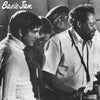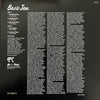



Count Basie – Basie Jam
ORDER LIMITED TO ONE ITEM PER CUSTOMER
Piano, Organ - Count Basie [click here to see more vinyl featuring Count Basie]
Tenor saxophone - Zoot Sims [click here to see more vinyl featuring Zoot Sims]
Bass - Ray Brown [click here to see other vinyl featuring Ray Brown]
Trombone - Jay Jay Johnson [click here to see more vinyl featuring Jay Jay Johnson]
Tenor saxophone - Eddie "Lockjaw" Davis [click here to see more vinyl featuring Eddie "Lockjaw" Davis]
Drums - Louie Bellson
Guitar - Irving Ashby
Trumpet - Harry Edison
Written by Count Basie
1 LP, Gatefold jacket by Stoughton Printing
Limited numbered edition
Original analog Master tape : YES
Heavy Press : 180g
Record color : black
Speed : 33RPM
Size : 12”
Stereo
Studio
Record Press : Quality Record Pressings
Label : Analogue Productions
Original Label : Pablo Records
Recorded December 10, 1973
Engineered by Phil Stern
Produced by Norman Granz
Mastered by Doug Sax
Photography by Phil Stern
Originally released in 1974
Reissued in June 2024
Tracks :
Side A:
- Doubling Blues
- Hanging Out
- Red Bank Blues
Side B:
- One-Nighter
- Freeport Blues
Reviews :
"The official start of Count Basie's decade-long association with Norman Granz's Pablo label was a bit disappointing, an all-star cast (with trumpeter Harry "Sweets" Edison, trombonist J.J. Johnson and tenors Eddie Davis and Zoot Sims) playing one blues after another. Reasonably pleasing but uninspired, there would be many better Basie dates coming up." AllMusic Review by Scott Yanow.
"Count Basie led “The Band That Plays the Blues,” and indeed his band did in its own swinging style for decades, propelling one of the major movements in American music. Long heralded as a giant of jazz, Basie built on a foundation of blues that was always evident in his music. He played blues piano with an easy, economical touch, wrote or revamped an impressive cache of blues and jump tunes, and employed vocalists who could sing the blues with the same mastery the Basie band displayed on their instruments.
William James Basie was born in Red Bank, New Jersey, on August 21, 1904, and learned piano from his mother. Early professional experience came in Harlem and on the road accompanying singers Katie Crippen and Gonzell White on the vaudeville circuit. A tour with White brought him to Kansas City in 1927, and he ended up working in the area with Walter Page’s Blue Devils and the Bennie Moten orchestra. His first studio recording was on a Moten session in 1930. Basie’s big break came while fronting his own Barons of Rhythm, which included several alums of the Blue Devils and Moten’s band, in 1935-36 at the Reno Club on 12th Street. W9XBY, a new experimental high fidelity AM radio station, broadcastfrom the club nightly, and its signal carried far enough for producer and critic John Hammond to hear it. Hammond came to see Basie at the Reno and by late 1936 Basie was recording on his own and touring the East Coast.
New York became his new base, but his sound was forever linked to Kansas City, a freewheeling crossroads that was a magnet for musicians who found plenty of opportunities to work, jam and exchange ideas.
As a bandleader, Basie employed an easy, uncomplicated approach that allowed both for cohesion and improvisation, infectious riffing and dueling soloists. In common with many blues artists of the era, most of the original band members weren’t formally trained and learned by memory and played by feel, not by reading sheet music. Notable soloists included Lester Young Herschel Evans, Buck Clayton and Harry “Sweets” Edison, and the exemplary rhythm section consisted of Basie, guitarist Freddie Green, bassist Walter Page, and drummer Jo Jones.Longtime Basie vocalist Jimmy Rushing sang on Basie’s classic recordings of “Goin’ to Chicago Blues,” “Sent For You Yesterday and Here You Come Today,” “Good Morning Blues,” and a song from their first session in 1936 simply called “Boogie Woogie” with the tag line “I may be wrong but I won’t be wrong always.” Rushing’s depth and delivery were hugely influential on the generation of jump blues shouters in the coming wave of rhythm & blues and rock ’n’ roll – just as the beat and bravado of the Basie orchestra paved a path for the upcoming bands to follow. In addition to hits by the orchestra such as “One O’Clock Jump” and “Jumpin’ at the Woodside,” the Basie discography also included blues and boogie-woogie piano features with the rhythm section such as “How Long Blues” and “The Dirty Dozens.”
Billie Holiday, Helen Humes and Joe Williams also sang with the Basie unit, and the Basie-Williams rendering of “Everyday I Have the Blues” was a Billboard hit in 1955. The orchestra, sans Basie, played behind Etta James and LaVern Baker on a 1956 broadcast later released on an LP as Alan Freed’s Rock ‘n’ Roll Dance Party and played on a 1959 session with B.B. King. In addition to recording with such luminaries as Tony Bennett, Frank Sinatra, and Ella Fitzgerald, Basie also did a session with Jackie Wilson in 1968 which resulted in two singles on the Billboard chart. Later Basie collaborations included albums with blues vocals by Big Joe Turner and Eddie “Cleanhead” Vinson.Basie was able to buy a home in the Bahamas in the 1970s and was residing there when he took ill in 1984. He spent his last days at a hospital in Hollywood, Florida, where he died on April 26. While he has been honored with too many awards to mention, it is only appropriate that the Blues Hall of Fame recognize Count Basie both for the debt he owed to the blues and for what he gave back in return." By Blues.org
Ratings:
Discogs : 4.45 / 5 ; AllMusic : 2 / 5 ; The Rolling Stone Jazz Record Guide : 4 / 5 ; The Penguin Guide to Jazz Recordings : 3 / 5



